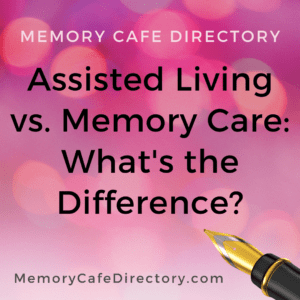Memory Cafe Directory posts and/or links to retailers can be advertising, sponsored, or affiliate links. We may earn a small commission from them. Thank you.
What’s the Difference?
Caring for a loved one as they age or undergo health changes presents a number of decisions to be made in order to maintain their well-being and happiness. Your loved one may be experiencing a change to their mobility, cognitive abilities, mood, or behaviors, all of which are reasons to consider an assisted living facility or a memory care facility.
While both situations offer a multitude of benefits to seniors and those needing assistance with the tasks of daily living, there are some crucial differences between memory care and assisted living services.
You may be asking yourself “Assisted Living vs Memory Care?” Which one is right for your loved one? Read this guide to learn more about what each living situation can offer.
Similarities Between Assisted Living vs Memory Care
It can be useful to note that there are many similarities between assisted living and memory care facilities. In both assisted living and memory care, residents will enjoy living spaces, most commonly in the form of apartment-style living that offers personal quarters, private bathrooms, communal spaces for socialization, and places to take communal meals and experience entertainment.
Both assisted living and memory care are designed to fully support loved ones with a wide range of health issues. Both units are staffed with nurses and nursing assistants who can provide assistance and care as needed.
Plus, both memory care and assisted living facilities will give your loved one as many opportunities for socialization and independence as is appropriate—which has been proven crucial to happiness in those senior years, with more social people enjoying better health and better quality of life.
Who Is a Candidate for Assisted Living vs Memory Care?
Even though memory care and assisted living facilities can be similar, there are clear distinctions between the individuals who will benefit from memory care versus the individuals who will benefit most from assisted living.
Assisted living is a wonderful way to support a loved one who needs assistance completing the tasks of daily living, such as getting dressed, cooking meals, cleaning, and can no longer run errands for themselves.
Generally speaking, most residents of assisted living retain their memories and reasoning skills but may need help physically managing day-to-day living. For these individuals, assisted living can provide fantastic support and healthy socialization to ensure they remain safe, healthy, and happy.
Signs Someone is Ready for Memory Care
Candidates for memory care tend to be those who have been officially diagnosed with a disease that impacts their cognitive function, such as dementia or Alzheimer’s.
Memory care generally comes in two forms: a residential facility, or in-home care from trained caregivers who specialize in working with those diagnosed with Alzheimer’s and dementia.
Typically it is a good time to find a memory care unit or memory care services for a loved one once they lose the ability to perform daily tasks, are frequently disoriented, their behavior has started to become erratic, or it is difficult for their family to manage their daily needs. In these cases, memory care can be a wonderful way to support your loved one and ensure they receive professional care and maintain a good quality of life as their disease progresses.
What does it mean to place a loved one in memory care versus assisted living? There are a few key differences that make the two experiences distinct.

Photo by Ravi Patel on Unsplash
Memory Care Staff Training
While the staff in assisted living units will be well-trained and experienced in caring for individuals with a wide variety of health issues, staff in memory care facilities generally have more specialized experience and continued training to help them work with patients diagnosed with Alzheimer’s or dementia.
Depending on where you live, that specialized training may even be required by your state in order to make sure all staff members know the best practices for interacting with individuals who suffer from memory loss so they can meet them where they are and tailor their interactions to each resident’s needs.
Generally, the staff-to-patient ratios in memory care tend to be lower than in assisted living facilities—where residents have a little more independence—to ensure that every memory care resident gets the attention and support that will help them thrive.
Memory Care Activities
While both assisted living environments and memory care facilities will provide residents with entertainment and activities meant to encourage socialization and healthy habits, memory care units often offer specialized memory-related activities that help delay the onset of dementia and Alzheimer’s symptoms.
Typical assisted living activities might include arts and crafts, game nights, walks through the grounds or time outside, and themed socialization nights. Memory care typically expands on those activities with memory-stimulating games, speech therapy, art therapy, sensory stimulation, occupational therapy, and more.
Research has shown that Memory Joggers and memory-supporting games help keep the brain strong, and staff at memory care facilities will be well-versed in how to provide appropriate stimulation for dementia and Alzheimer’s residents.
Memory Care Security
Many times families decide they need to make a change to their living situation when Alzheimer’s or dementia symptoms start to interfere with their loved ones’ safety. Dementia and Alzheimer’s can make people prone to wander, to try to leave the house, leave doors or windows open, turn on appliances, or experience frequent nighttime wakings—all of which is a threat to their well-being and the well-being of your family.
Memory care facilities make provisions for these behaviors to ensure that residents remain safe at all times. Security features will vary depending on facility protocols but they frequently include security cameras, wearable devices or trackers for residents, and alarmed doors or locked windows and doors to make sure residents cannot wander too far unaccompanied by family or staff.
Memory Care Next Steps
The most important thing you can do before making a decision about memory care or assisted living for your loved one is to visit plenty of facilities. There can be subtle differences in philosophy, the physical layout of a space, or in the way the staff is trained, that may make one facility a better fit over another for you and your family members.
Ask plenty of questions and try to observe residents and staff interacting with one another—that will also give you a sense of what day-to-day life is like for residents and the quality of attention they receive. While these decisions can be difficult, know that you are doing the best you can for your loved one by researching the place that will offer them the best support and care for their evolving needs.





